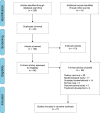National primary care responses to COVID-19: a rapid review of the literature
- PMID: 33293398
- PMCID: PMC7725079
- DOI: 10.1136/bmjopen-2020-041622
National primary care responses to COVID-19: a rapid review of the literature
Abstract
Objective: The aim of this review, conducted in April 2020, is to examine available national primary care guidelines for COVID-19 and to explore the ways in which these guidelines support primary care facilities in responding to the demands of the COVID-19 pandemic.
Design: Rapid review and narrative synthesis.
Data sources: PubMed, Embase and Google, as well as the websites of relevant national health departments, were searched from 1 January 2020 to 24 April 2020.
Eligibility criteria: Documents included must be issued by a national health authority, must be specific to COVID-19 care, directed at healthcare workers or managers, and must refer to the role of primary care in the COVID-19 response.
Results: We identified 17 documents from 14 countries. An adapted framework on primary care challenges and responses to pandemic influenza framed our analysis. Guidelines generally reported on COVID-19 service delivery and mostly made specific recommendations for ensuring continued delivery of essential primary care services through telehealth or other virtual care modalities. Few offered guidance to support surveillance as a public health function. All offered guidance on implementing outbreak control measures, largely through flexible and coordinated organisational models with partners from various sectors. There was a lack of guidance to support supply chain management and practice resilience in primary care, and lack of personal protective equipment represents a serious threat to the provision of quality care during the pandemic.
Conclusions: Current national primary care guidelines for COVID-19 provide guidance on infection control and minimising the risk of spread in primary care practices, while supporting the use of new technology and coordinated partnerships. However, to ensure primary care practice resilience and quality of care are upheld, guidelines must offer recommendations on supply chain management and operational continuity, supported by adequate resources.
Keywords: health policy; infection control; organisation of health services; primary care; protocols & guidelines.
© Author(s) (or their employer(s)) 2020. Re-use permitted under CC BY-NC. No commercial re-use. See rights and permissions. Published by BMJ.
Conflict of interest statement
Competing interests: None declared.
Figures
References
-
- World Health Organization Declaration of Astana [Internet. Geneva: World Health Organization, 2018. https://www.who.int/docs/default-source/primary-health/declaration/gcphc...
-
- World Health Organization Declaration of Alma-Ata International Conference on primary health care development. 47, 1978: 159–61.
-
- United Nations Political Declarationof the High-level Meeting on Universal Health Coverage “Universal health coverage: moving together to build a healthier world” [Internet]. New York, 2019. Available: https://www.un.org/pga/73/wp-content/uploads/sites/53/2019/07/FINAL-draf... [Accessed 28 Aug 2020].
Publication types
MeSH terms
LinkOut - more resources
Full Text Sources
Medical
Miscellaneous

